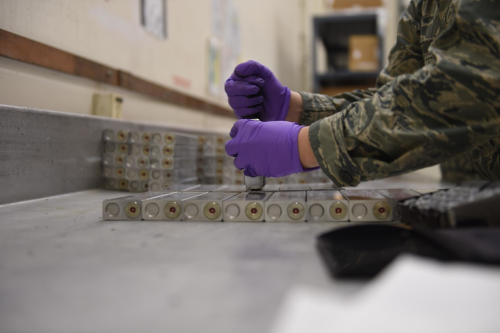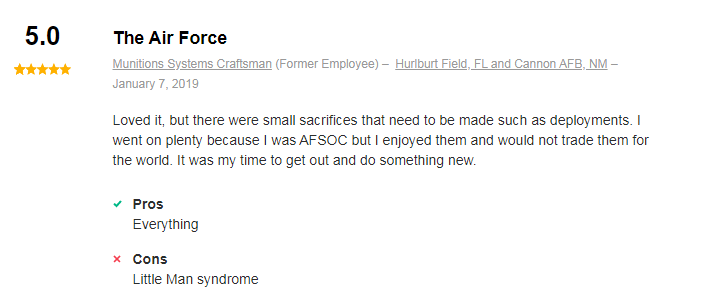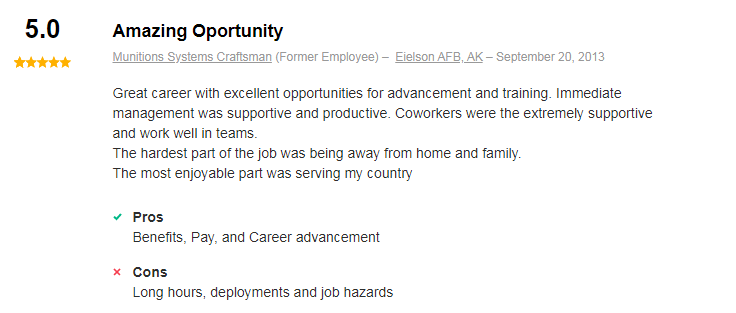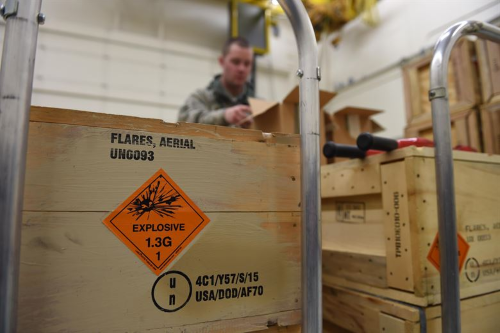It’s not only speed and stealth capabilities that make the tactical and bombing aircraft in the US Air Force some of the most formidable in the world.
Much of this has to do with the armaments that they carry too.
Air to air missiles, air to ground missiles, bombs, and other aircraft munitions play a key role in the lethality of US Air Force aircraft.
These munitions do not place themselves on the various Air Force aircraft either.
They are expertly put there by highly trained Air Force Munition Systems Experts.
These well-trained ordnance professionals, affectionately known as ‘Ammo’ and ‘knuckle draggers’, know exactly how to procure, safely handle, mount, and remove all the different types of munitions that go on their assigned types of aircraft.
Those in ‘Ammo’ must pay close attention to detail while working and always keep safe munitions handling practices at the forefront 100% of the time.
Not everyone has what it takes to work around high explosives and other types of bombs but those that do play a key role in helping to maintain the US Air Force’s offensive and defensive attack capabilities.
Here is a video that describes some of the duties that come with being an Air Force Munition Systems Specialist:
Air Force Munitions System Specialist Requirements and Qualifications
These are the prerequisite and other requirements that are needed in order for someone to pursue a career in the US Air Force as a Munitions System Specialist:
ASVAB Requirements
-
-
- Minimum ASVAB Score of 57 in the general category and 60 in the mechanical category
-
Additional Qualifications
-
-
- Be between the ages of 17 and 39
- Possess a GED or high school diploma
- Have normal color vision and depth perception
- Possess a valid state driver’s license to operate a government vehicle
- Have no record of emotional instability
- Never been convicted of domestic violence
- Successful completion of 8.5 weeks of Air Force Basic Military Training held at Joint Base Lackland in San Antonio, TX (Not required of those with prior military experience or training)
- Completion of a current Single Scope Background Investigation (SSBI) that leads to the ability of an Airman being granted access to Secret or higher level material
-
Related Article – Air Force Special Missions Aviation (1A9x1): Career Details
Training and Career Path to Become an Air Force Munitions System Specialist
Here are the training steps it takes to be able to fulfill the duty requirements associated with this Air Force career field.
Air Force Technical Training Information

Technical training for this Air Force specialty takes place at Sheppard AFB in Texas and lasts just under 2 months long.
During that time a new Airman will learn in a classroom and laboratory environment the basics of Munitions System tasks they will be doing.
This includes using the equipment and tools they will use to do their job.
They will also become familiar with the different types of bombs, fuses and tail kits that they will work with.
A new recruit in this career field will also learn how to identify munitions by such things as fillers, color codes, markings, and specific physical characteristics.
Also during technical training, the new Munitions System Specialist recruit will learn how to load and unload bomb carrying trailers.
They will also have to become familiar with processing such things as 20mm gun ammunition and other forms of aircraft ordnance.
On the Job Training
A new munitions system recruit cannot begin to learn all they need to know in just under 2 months of technical training.
That means that a large majority of the information that a new Air Force Munitions System Specialist needs to learn will be taught through on the job training.
Much of this essential hands-on training will be related to the specific aircraft that a munitions specialist will be working with at their first duty station.
It generally takes between 3 to 4 months of additional on the job training before a new recruit will be able to perform the duties required of an Air Force Munitions System Specialist on their own.
During this additional training period the munition systems recruit will also learn the value of teamwork in accomplishing their mission.
How Much Are Air Force Munitions System Specialist Paid?
Most starting out in this career field will be initially classified as an Airman Basic (E-1).
Those who have relevant schooling or training may be placed as high as an Airman (E-2) or Airman First Class (E-3) in rank.
Here is the current Air Force pay scale for enlisted members based on time in service and rank.
| Insignia | Pay Grade | Rank | Abbreviation | 2023 Minimum Monthly Pay |
|---|---|---|---|---|
| E-1 +4 months | Airman Basic | AB | $1,917.60 | |
| E-2 | Airman | Amn | $2,149.20 | |
| E-3 | Airman First Class | A1C | $2,259.90 | |
| E-4 | Senior Airman | SrA | $2,503.50 | |
| E-5 | Staff Sergeant | SSgt | $2,730.30 | |
| E-6 | Technical Sergeant | TSgt | $2,980.50 | |
| E-7 | Master Sergeant | MSgt | $3,445.80 | |
| E-8 | Senior Master Sergeant | SMSgt | $4,957.20 | |
| E-9 | Chief Master Sergeant | CMSgt | $6,055.50 | |
| E-9 | Command Chief Master Sergeant | CCM | $6,055.50 | |
| E-9 | Chief Master Sergeant Of The Air Force | CMSAF | $6,055.50 |
Other forms of pay and incentives a Munitions System Specialist may receive include such things as:
-
-
- Housing allowance for those that live off base (BAH)
- Subsistence allowance (Food – BAS)
- Temporary duty pay
- Hazardous duty pay
- Cost of living incentives
- Tuition reimbursement
-
All of the health care requirements for Air Force personnel are also always 100% covered.
Related Article – Air Force Radar, Airfield & Weather Systems (1C8X3): Career Profile
What’s Life Like as an Air Force Munitions System Specialist?
It’s normal for those working in this career field to be a little hesitant at first when handling high explosive munitions and other types of ammunition.
But despite this fact, this is considered a relatively safe Air Force career choice.
That’s because over the years the methods for safely handling and storing Air Force and military ordnance in general have improved dramatically.
While safety is always kept at the forefront of this Air Force position, a new Air Force Munitions System Specialist will also have to perform many of these duties too:
-
-
- Become proficient at handling, storing, transporting, arming, and disarming Air Force munitions.
- Must be able to work in one of 9 different munitions shop areas that include such things as maintaining munitions handling and transport equipment, arming and testing munitions, mounting and un-mounting munitions on aircraft, and munitions storage and accountability.
- Process, maintain, and recondition aircraft gun ammunition. Be able to install munitions components such as warheads, guidance control units, arming wires, fuses, squibs, strakes, added wings, directional fins, control apparatus, explosive bolts and anti-missile tracking flares.
- Periodically inspect munitions for readiness and carry out munitions product assurance procedures.
- Prepare documentation and properly mark unused aircraft munitions before taking them back to the bomb dump.
- Must be able to properly requisition aircraft munitions and complete the accompanying paperwork and due-in and due-out status files.
- Properly document, receive, and store new munitions that have become assets of a Munition Systems Specialist’s squadron.
- Prepare and document munitions that are designated for safe shipment.
- Maintain bomb storage facilities in an orderly manner while adhering to all safety and security requirements.
-
In order to successfully accomplish the specific mission requirements that Air Force Munitions Systems Specialists are asked to carry out, it is essential for an Airman to help build a culture of teamwork and camaraderie within the ‘bomb dump’ and aircraft munitions loading areas.
Job Reviews
There is a common theme among those who have worked in this Air Force Position.
Most say it’s a very challenging and rewarding Air Force career choice that will also put stress on family time with some occasional long working hours and some temporary deployments away from home on a fairly regular basis.
Here are two reviews from former Air Force Munition System Specialists that were found on the website Indeed.com.


Related Article – Air Force Drone Pilot (1U0X1): Career Profile
Air Force Munitions System Specialist Civilian Career Opportunities
Let’s be honest; there is not a big demand in the civilian world for those that handle, load, and unload high explosive weaponry.
That, however, does not mean that there are no civilian positions that can use the skills that a Munitions System Specialist acquired during their time in the Air Force.
Many of these positions are military and government related because of shortages across the board in this particular Air Force career field.
Hera re some of the different types of civilian positions that former Air Force Munitions System Specialists are capable of filling:
-
-
- Warehouse management and inventory control
- Aircraft loading and unloading operations
- Package logistics and transportation
- Munitions Systems Training Specialist
- Working as government bomb disposal technicians
- Missile and bomb test evaluators
-
Here are some civilian companies and government organizations that are known to hire those that have experience as an Air Force Munitions System Specialist:
-
-
- US Department of the Army – Chambersburg, PA
- Lockheed Martin Corporation – Greenville, SC
- Akima, LLC – Fayetteville, NC
- Innovative Reasoning, LLC – Albuquerque, NM
- MS2USA – Cannon AFB, NM
- Datamatics Global Services Ltd – Clearwater, FL
- Jacobs – Dugway, UT
-
Many of these munitions job positions start at better than $45,000 per year.
References:
Official Air Force Recruiting Page
Air Force Reserve Official Page
Air National Guard Official Page
- 5 Worst Jobs in the Air Force - June 20, 2024
- 4 Steps For Visiting An Air Force Recruiter Near You - June 19, 2024
- Air Force Safety Specialist (1S0X1) - June 19, 2024

